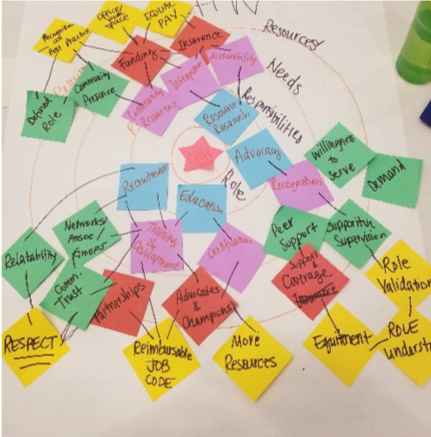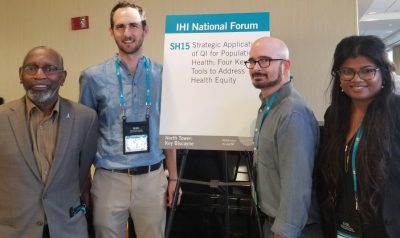Rabbani champions role of community health workers in search for health equity solutions
January 3, 2020

Rumana Rabbani
Rumana Rabbani, a doctoral student in health policy and management at the UNC Gillings School of Global Public Health, recently received a scholarship from 100 Million Healthier Lives to attend the American Public Health Association (APHA) Fall Gathering in Philadelphia, where she gave a presentation on systems thinking tools and models to empower community health workers within the practice of public health.
Rabbani – who works as a research assistant with the Robert Wood Johnson Foundation (RWJF), as well as with the Family Planning National Training Center for Title X Services – served as chair for the APHA Community Health Worker (CHW) section’s pre-APHA CHW Summit. In addition, she has served as the CHW section’s chair of the awards committee and policy committee, as well as chair of the CHW Caucus. At the Gillings School, she is the co-president of the Implementation Science Student Group.
It’s a long list of leadership engagements for Rabbani, who is passionate about addressing the health inequities faced by those in marginalized communities. After graduating from the Gillings School’s Health Policy and Management (HPM) Department with a Master’s in Healthcare Administration, she has continued in the HPM program as a doctoral student with a minor in implementation science. Her research is at the intersection of community health, systems thinking and implementation science, seeking to develop a framework that will sustainably link the worlds of clinical and non-clinical care in order to holistically address diverse health challenges of communities across the country.

Participants in the pre-APHA Community Health Worker Summit completed a mapping activity on system support.
Working as the chair of the pre-APHA Community Health Worker Summit has given Rabbani the opportunity to interact directly with public health professionals who see the individual issues patients and individuals face. “For an hour, we did a round table activity using system support mapping for 125 attendees representing payers, providers, community-based organizations, community health workers and government sectors,” said Rabbani. “I think it really gave community health workers a voice at the table, which they often don’t have because of the institutional power of payers, providers and government in the system. They’re front-line workers who often get ignored, even though they’re the ones directly working with the patients and individuals.”
Part of Rabbani’s research in her work with RWJF (which funds the 100 Million Healthier Lives organization) focuses on the facets of race equity in health care and public health. She works in workgroups like the Race Equity Action Community and the People with Lived Experience Action Community to address issues of structural racism, examining ground-level issues that cause problems in public health systems and strategically integrating those individuals with lived experience as community champions. She plans to integrate that work into her role as chair of next year’s pre-APHA Community Health Worker Summit.
“I’m really excited about it,” said Rabbani, “because instead of presenting to the same people about the same thing, we’re going to be providing race equity and inclusion training to community health workers, payers, providers and other stakeholders in the health care and public health system. It will hopefully start the process of breaking down barriers between community health workers and those who have institutional power through authentic dialogue.”

Rumana Rabbani attends the IHI National Forum.
Rabbani also presented this year at the Institute for Healthcare Improvement (IHI) National Forum and at the American Evaluation Association Conference.
At the Gillings School, she is currently shaping her future as a research practitioner, but she believes the forefront of her research will involve co-designing with community members. “All the work I do is focusing on social determinants — getting into the root cause of problems and co-designing solutions with our community members and people with lived experience. Because they’re the ones that have first-hand expertise, and we have that flipped in the health care system. I want to get back to the root causes of why we’re not getting to the outcomes we want.”
Contact the Gillings School of Global Public Health communications team at sphcomm@unc.edu.
